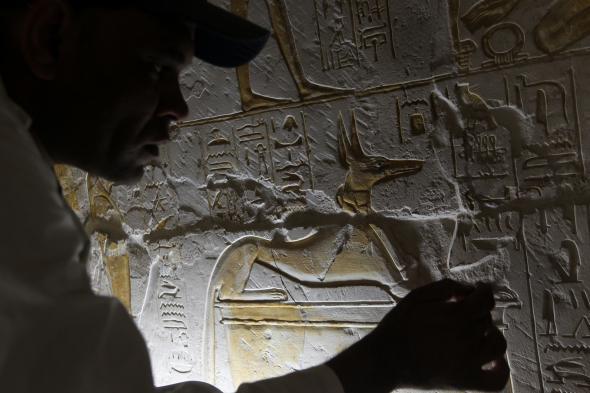This question originally appeared on Quora, the best answer to any question. Ask a question, get a great answer. Learn from experts and get insider knowledge. You can follow Quora on Twitter, Facebook, and Google Plus.
Answer by Amy Calvert, founder and director at Art of Counting, contributing editor at SmartHistory:
I have a Ph.D. in Egyptology from the Institute of Fine Arts at New York University and have worked as registrar on an excavation at Abydos, photographed in closed tombs in the Valley of the Kings, and cataloged objects in the Egyptian department of the Museum of Fine Arts, Boston.
Most of my colleagues and I had a very early fascination for ancient Egypt, although that isn’t universally the case. Most of us are interested in other ancient cultures as well, but Egypt holds endless interest. One thing to remember is that although, as an Egyptologist, you (obviously) have to be familiar with all aspects of the culture through its very long history, we almost always end up specializing in a few areas. For instance, I specialize in New Kingdom royal regalia, chariot symbolism, and weapons development, although my core project (Art of Counting) aims to quantify visual elements to apply statistics to their usage and is, thus, broader. I have friends, however, who will spend their entire careers investigating Third Intermediate Period coffin decoration—and never run out of stuff. There is just so much that hasn’t been properly investigated. Even a large percentage of the rich material from the tomb of Tutankhamun has yet to be fully researched.
Learning at least Middle Egyptian is an absolute requirement—several years, to the point where you can sight-read most texts (which are, happily for the nonphilologists among us, highly formulaic). Other eras of Egyptian become essential depending on your area of focus; if you are researching the Ptolemaic period, for instance, you will have a ton more signs to learn. In addition to hieroglyphs, there are also the more “cursive” forms of writing, called hieratic and demotic. In terms of other languages, you will be required to have reading fluency in German and French, since much Egyptological research is published in these languages. The ability to speak these languages fluently is also a big plus when it comes to finding a job, since it opens up the possibilities of where you can work (hard to take a post in Berlin if you can’t speak German).
Graduate school, specifically a Ph.D., is a requirement also. You can’t call yourself an Egyptologist with a master’s degree; it’s just one of those fields where your work is barely recognized unless you are at least a doctoral candidate.
As for work, it is hard. If you are a skilled excavator, have mapping experience, conservation knowledge, or specialize in something specific (like dendrochronology, seeds, or ibis mummies) and are able to be a global nomad, you will have little trouble bouncing from one excavation to another (as long as you do good work and don’t cause issues on site). Many new Ph.D.s compete for the (relatively few) university fellowships, which generally last six months to two years, at best. But, again, you have to have the freedom to move. For those who cannot pick up every six months and move, options are more limited.
Very few university programs have an Egyptology department; many schools—even if they have a classics or ancient Near East department—can support no more than one Egyptologist, if any. I can count the number of Egyptology programs in the Western hemisphere and not run out of fingers. Some of my Ph.D.-holding colleagues have awesome full-time tenured posts at Brown and UCLA; others are Starbucks baristas. Any time there is a post for any Egyptology job at a university or in museum curation (and we are talking like three per year or so, by the way), literally hundreds of us will apply.
As long as you accept that actually getting a long-term, steady job in Egyptology is a crapshoot, then go for it. But do it with eyes open, and train yourself along the way to do other work so you can make some money while you do your Egypological research in your free time. If you love it, you won’t be able to do otherwise. And who knows? You might luck out.
Personally, I have taught art appreciation and art history as an adjunct at a number of colleges and now work in digital marketing for a very high-end jewelry store. Using my innate interest and research on ancient jewelry and metalworking, I developed a great deal of knowledge that can be related to modern jewelry techniques. Despite the fact that I have yet to get a “real” Egyptology job, I have published my work in peer-reviewed venues, have multiple books in the works, speak regularly at annual Egyptological conferences, and head a global research team. Never have I considered my Ph.D. anything but a benefit. Would I love to land a full-time job in a museum? Hell yes. However, I have no regrets whether or not I ever do. An intimate knowledge of Egyptian history and the ability to contribute to our understanding of this astonishing and fundamental culture is, for me, reward enough.
More questions on Quora:
